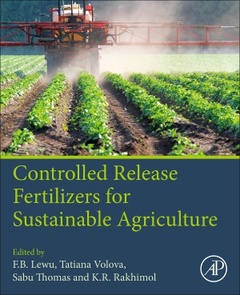Controlled Release Fertilizers for Sustainable Agriculture
Coordonnateurs : Lewu F.B, Volova Tatiana, Thomas Sabu, Rakhimol R.K.

Controlled Release Fertilizers for Sustainable Agriculture provides a comprehensive examination of precision fertilizer applications using the 4-R approach?the right amount of fertilizer at the right time to the right plant at the correct stage of plant growth. This volume consolidates detailed information on each aspect of controlled release fertilizers, including up-to-date literature citations, the current market for controlled release fertilizers and patents. Presenting the tremendous advances in experimental and theoretical studies on sustainable agriculture and related areas, this book provides in-depth insight into state-of-the-art controlled release mechanisms of fertilizers, techniques, and their use in sustainable agriculture.
Conventional release mechanisms have historically meant waste of fertilizers and the adverse effects of that waste on the environment. Controlled release delivery makes significant strides in enhancing fertilizer benefit to the target plant, while protecting the surrounding environment and increasing sustainability.
2. Conventional methods for fertilizer release
3. Fate of the conventional fertilizers in environment
4. Controlled release of fertilizers- concept, reality and mechanism
5. Controlled and slow release fertilizers
6. Characteristics and types of slow- and controlled-release fertilizers
7. Methods for controlled release of fertilizers
8. Manufacturing of slow- and controlled-release Fertilizers
9. Factors controlling the release of fertilizers, Advantages and disadvantages of slow- and controlled-release fertilizers
10. Options for the application of slow- and controlled-release fertilizers, Consumption and economics of slow- and controlled-release of fertilizers
11. Costs and benefits of slow- and controlled-release fertilizers, Sensors detecting controlled fertilizer release
12. Trends and technologies behind controlled release fertilizers
13. Nanotechnology in controlled release fertilizers
14. Polymer formulations for controlled release of fertilizers
15. Chemistry and toxicology behind chemical fertilizers, Theory and simulation modelling of controlled release of fertilizers
16. Controlled release of organic fertilizers, Future of controlled release fertilizers
Scientists and researchers in Agriculture, Polymer and Material Science, Polymer Technologists and engineers
Tatiana Volova is a doctor of biological sciences in microbiology, Professor and head of the Department of Biotechnology at the Siberian Federal University. She is the creator and head of the Laboratory of Chemoautotrophic Biosynthesis in the Institute of Biophysics, Siberian Branch of Russian Academy of Sciences. Professor Volova is conducting research in the field of physic-chemical biology and biotechnology and a well-known expert in the field of microbial physiology and biotechnology. Tatiana Volova has created and developed a new and original branch in chemoautotrophic biosynthesis, in which the two main directions of the XXI century technologies are conjugate, hydrogen energy and biotechnology. Tatiana Volova is the author of more than 300 scientific works, including 12 monographs, 16 inventions, and a series of textbooks for universities.
Dr. Thomas is the Vice-Chancellor and a Professor of Polymer Science and Engineering at Mahatma Gandhi University, India. Additionally, he serves as the Director of the School of Energy Materials at the same institution. Dr. Thomas is in
- Presents cutting-edge interdisciplinary insights specifically focused on the controlled release of fertilizers
- Explores the benefits and challenges of 4-R fertilizer use
- Includes expertise from leading researchers in the fields of agriculture, polymer science, and nanotechnology working in industry, academics, government, and private research institutions across the globe
- Presents the tremendous advances in experimental and theoretical studies on sustainable agriculture and related areas
Date de parution : 10-2020
Ouvrage de 266 p.
15x22.8 cm
Thèmes de Controlled Release Fertilizers for Sustainable Agriculture :
Mots-clés :
Air pollution; Band deep placement; Binder; Biodegradable coatings; Biofertilizers; Broadcasting; Chemical fertilizer; Chemically inhibited fertilizers; Coated fertilizers; Coating fertilizer; Controlled fertilizer; Controlled release fertilizers; Controlled release of organic fertilizers; Controlled; Controlled-release fertilizer; Controlled-release fertilizers; CRFs; Diffusion; Dissolution test; Fertigation; Fertilizer efficiency; Fertilizer guidelines; Fertilizer side effects; Fertilizer; Fertilizers; Foliar application; Granule; Heavy metal accumulation; Hydrophilic polymers; Leaching process; Macromolecular slow-release fertilizer (MSF)Organic manure; Macronutrients; Matrix based; Matrix; Modified clays; Nanoaptamer; Nanofertilizer; Nanosensors; Nanotechnology; Nanotoxicity; NPK; Nutrient element; Nutrient; Nutrients release time; Occlusions; Organic fertilizers; Organic polymers; Plant growth; Pollution; Polymer formulations; Polymer; Preparation; Release monitoring sensors; Slow and controlled release; Slow release fertilizer; Slow release fertilizers; Slow-release fertilizers; Soil fertility; Soil incubation test; Soil pollution; Soil; Sulfur; Superhydrophobic fertilizer; Technologies; Trends; Water pollution; Wrapped SRF; Zeolite



